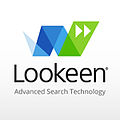
Microsoft Office, MS Office, or simply Office, is a family of client software, server software, and services developed by Microsoft. It was first announced by Bill Gates on August 1, 1988, at COMDEX in Las Vegas. Initially a marketing term for an office suite, the first version of Office contained Microsoft Word, Microsoft Excel, and Microsoft PowerPoint. Over the years, Office applications have grown substantially closer with shared features such as a common spell checker, Object Linking and Embedding data integration and Visual Basic for Applications scripting language. Microsoft also positions Office as a development platform for line-of-business software under the Office Business Applications brand.
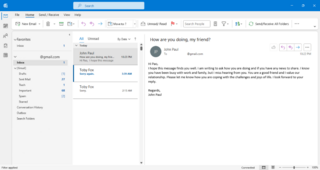
Microsoft Outlook is a personal information manager software system from Microsoft, available as a part of the Microsoft 365 software suites. Though primarily being popular as an email client for businesses, Outlook also includes functions such as calendaring, task managing, contact managing, note-taking, journal logging, web browsing, and RSS news aggregation.

The Bat! is an email client for the Microsoft Windows operating system, developed by Moldovan software company Ritlabs. It is sold as shareware and offered in three editions: Home Edition, Professional Edition, and Voyager which is a portable version and is included with Professional Edition.
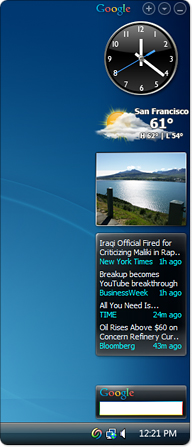
Google Desktop was a computer program with desktop search capabilities, created by Google for Linux, Apple Mac OS X, and Microsoft Windows systems. It allowed text searches of a user's email messages, computer files, music, photos, chats, web pages viewed, and the ability to display "Google Gadgets" on the user's desktop in a sidebar.

Desktop search tools search within a user's own computer files as opposed to searching the Internet. These tools are designed to find information on the user's PC, including web browser history, e-mail archives, text documents, sound files, images, and video. A variety of desktop search programs are now available; see this list for examples. Most desktop search programs are standalone applications. Desktop search products are software alternatives to the search software included in the operating system, helping users sift through desktop files, emails, attachments, and more.

Zimbra Collaboration, formerly known as the Zimbra Collaboration Suite (ZCS) before 2019, is a collaborative software suite that includes an email server and a web client.
An IFilter is a plugin that allows Microsoft's search engines to index various file formats so that they become searchable. Without an appropriate IFilter, contents of a file cannot be parsed and indexed by the search engine.
The following tables compare general and technical information for a number of notable webmail providers who offer a web interface in English.
Microsoft engineering groups are the operating divisions of Microsoft. Starting in April 2002, Microsoft organised itself into seven groups, each an independent financial entity. In September 2005, Microsoft announced a reorganization of its then seven groups into three. In July 2013, Microsoft announced another reorganization into five engineering groups and six corporate affairs groups. A year later, in June 2015, Microsoft reformed into three engineering groups. In September 2016, a new group was created to focus on artificial intelligence and research. On March 29, 2018, a new structure merged all of these into three.

Outlook.com, formerly Hotmail, is a free personal email service offered by Microsoft. This includes a webmail interface featuring mail, calendaring, contacts, and tasks services. Outlook can also be accessed via email clients using the IMAP or POP protocols.

Windows Search is a content index and desktop search platform by Microsoft introduced in Windows Vista as a replacement for the previous Indexing Service of Windows 2000, Windows XP, and Windows Server 2003, designed to facilitate local and remote queries for files and non-file items in the Windows Shell and in compatible applications. It was developed after the postponement of WinFS and introduced to Windows several benefits of that platform.

LogicalDOC is a proprietary cloud-based document management system that is designed to handle and share documents within an organization. LogicalDOC is a content repository, with Lucene indexing, Activiti workflow, and a set of automatic import procedures. The system was developed using Java technology.

Microsoft Office 2016 is a version of the Microsoft Office productivity suite, succeeding both Office 2013 and Office for Mac 2011 and preceding Office 2019 for both platforms. It was released on macOS on July 9, 2015, and on Microsoft Windows on September 22, 2015, for Office 365 subscribers. Mainstream support ended on October 13, 2020, and extended support for most editions of Office 2016 will end on October 14, 2025. The perpetually licensed version on macOS and Windows was released on September 22, 2015. Office 2016 is compatible with Windows 7 SP1 and Windows Server 2008 R2 SP1 through Windows 11 v23H2 and Windows Server 2022. It also requires OS X Yosemite at the minimum. It is the last version of Microsoft Office to support Windows 7 SP1, Windows Server 2008 R2 SP1, Windows 8, Windows Server 2012, Windows 8.1, Windows Server 2012 R2, Windows 10 RTM–v1803 and Windows Server 2016.

Mail was an email client developed by Microsoft and included in Windows Vista and later versions of Windows. It is available as the successor to Outlook Express, which was either included with, or released for Internet Explorer 3.0 and later versions of Internet Explorer. It is set to be replaced by Outlook for Windows.
Axonic Informationssysteme GmbH is a privately held software developer, based in Karlsruhe, Germany that develops and markets products focused on digital communication and information.

MSP360, formerly CloudBerry Lab, is a software and application service provider company that develops online backup, remote desktop and file management products integrated with more than 20 cloud storage providers.

X1 Discovery, Inc., previously known as X1 Technologies, Inc., is a privately held software company, based in Pasadena, California, United States, that develops and markets products for people and organizations that need to find information quickly. It is an operating company of Idealab, and is backed by U.S. Venture Partners.
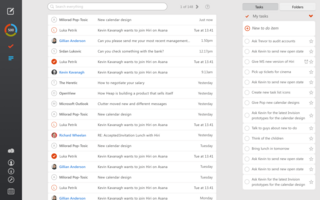
Hiri was a business focused desktop e-mail client for sending and receiving e-mails, managing calendars, contacts, and tasks. It was developed as an alternative to existing e-mail clients and calendar applications such as Microsoft Outlook and Mozilla Thunderbird.
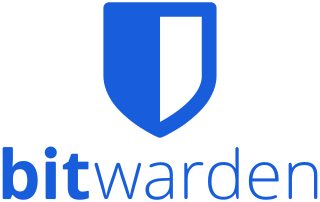
Bitwarden is a freemium open-source password management service that is used to store sensitive information, such as website credentials, in an encrypted vault. The platform hosts multiple client applications, including a web interface, desktop applications, browser extensions, mobile apps, and a command-line interface. The platform offers a free US or European cloud-hosted service as well as the ability to self-host.

Microsoft 365 is a product family of productivity software, collaboration and cloud-based services owned by Microsoft. It encompasses online services such as Outlook.com, OneDrive, Microsoft Teams, programs formerly marketed under the name Microsoft Office, enterprise products and services associated with these products such as Exchange Server, SharePoint, and Viva Engage. Microsoft 365 also covers subscription plans encompassing these products, including those that include subscription-based licenses to desktop and mobile software, and hosted email and intranet services.
